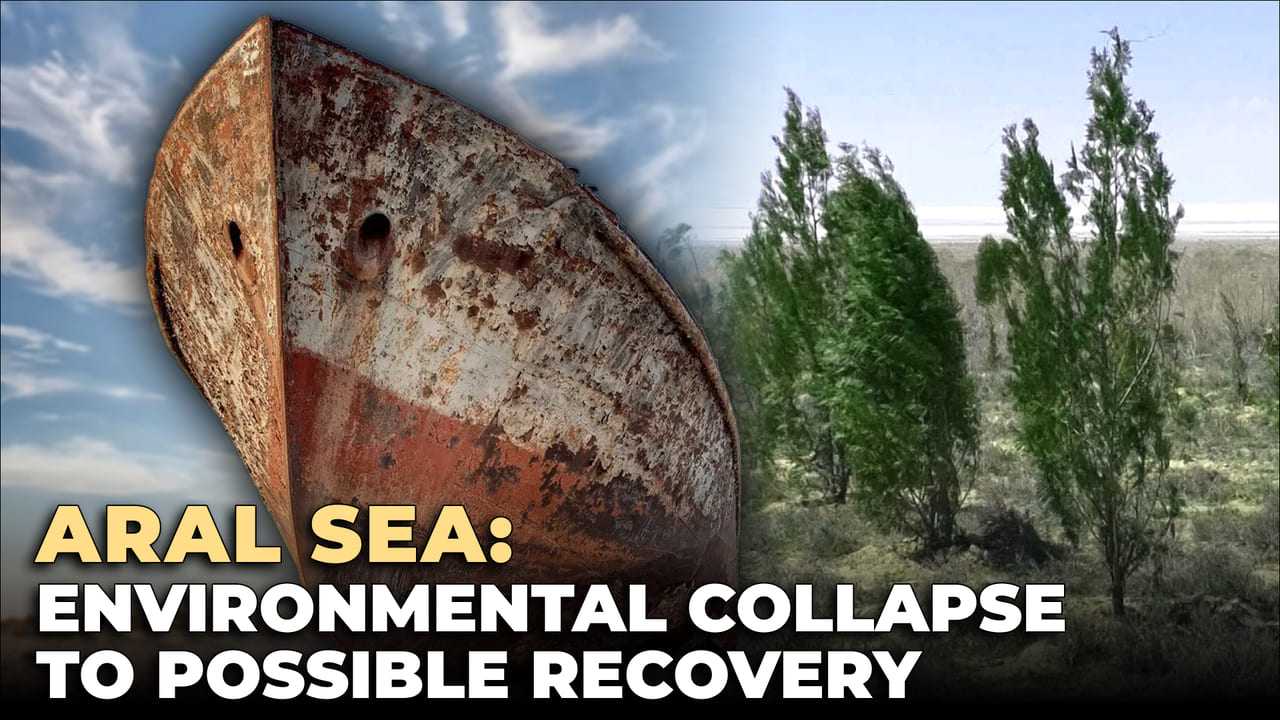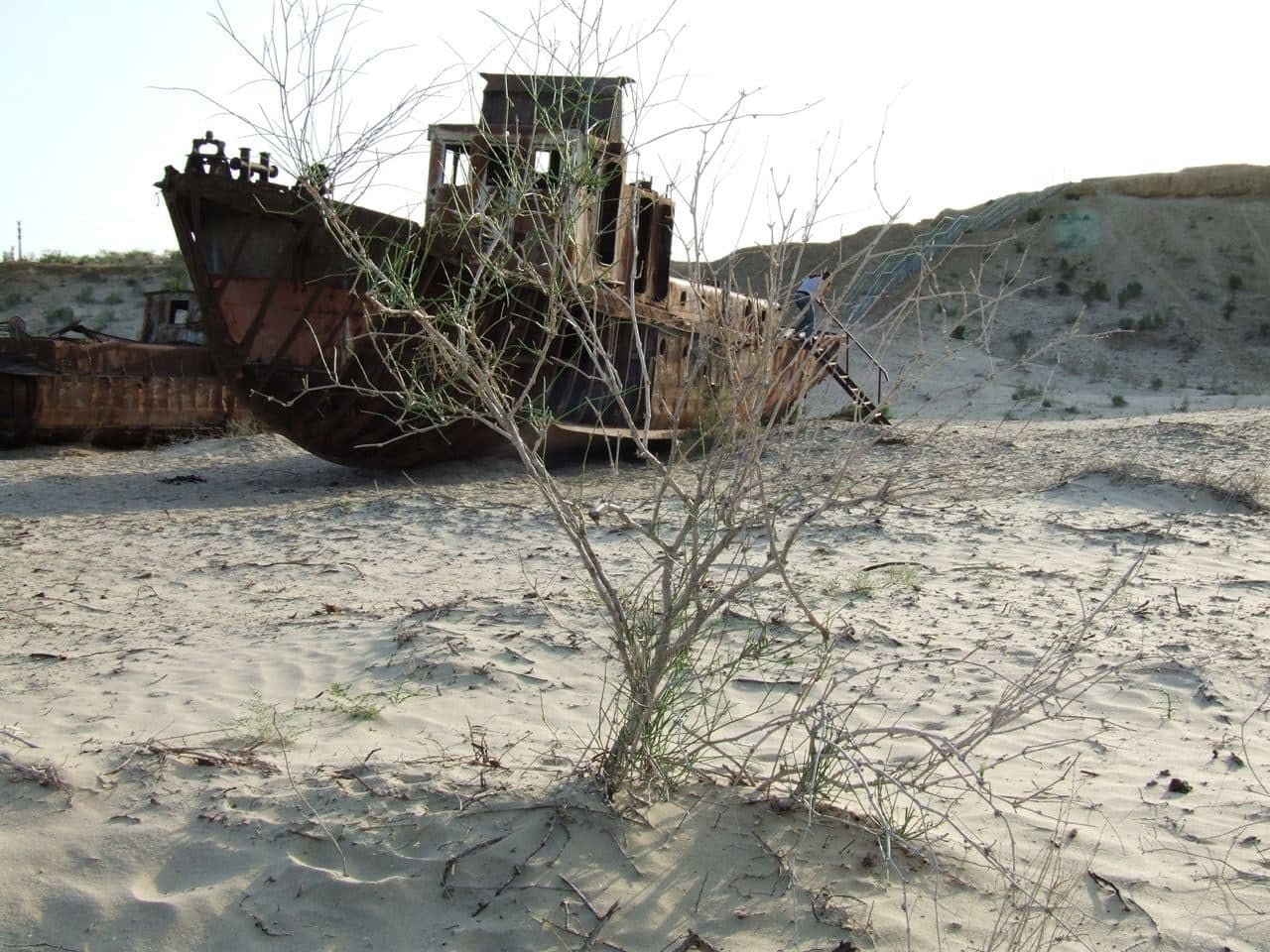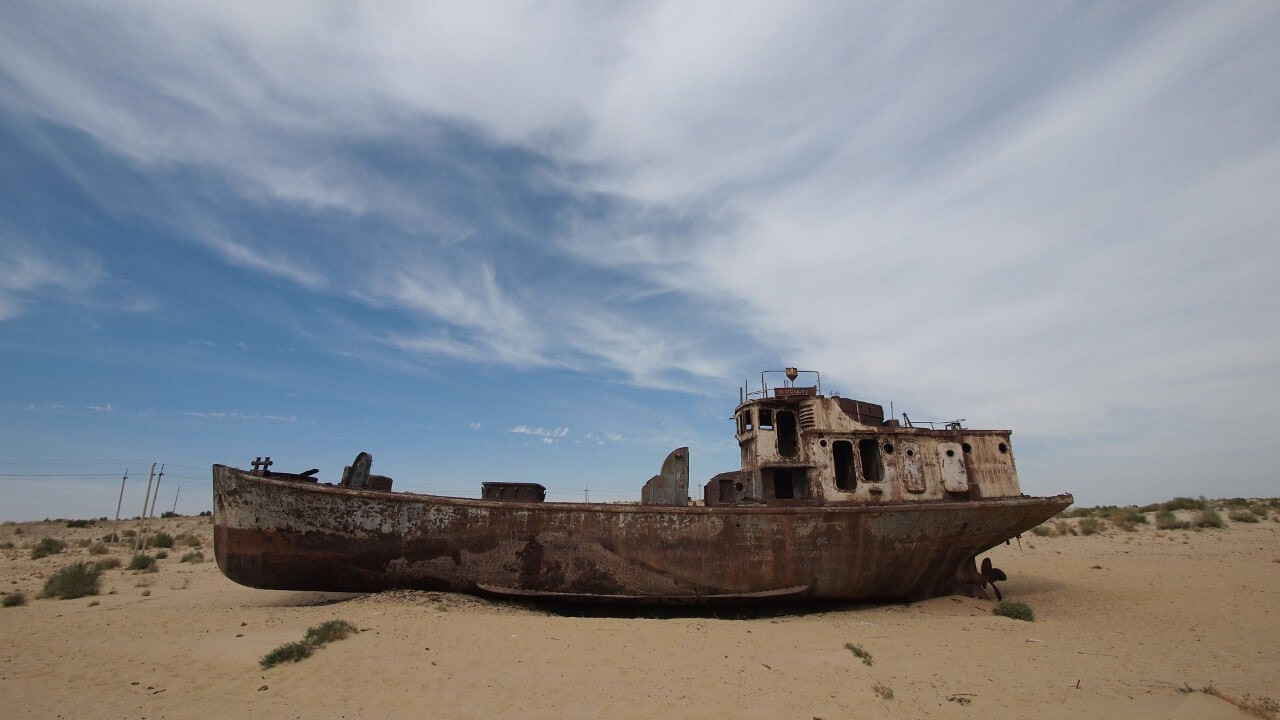"When the well is dry, we know the worth of water,"
Benjamin Franklin, Founding Father of the United States
Once the fourth-largest lake in the world, the Aral Sea has become a symbol of environmental catastrophe. Nestled between Kazakhstan and Uzbekistan, this vast body of water has shrunk dramatically since the 1960s, primarily due to the diversion of rivers for irrigation projects initiated during the Soviet era. The repercussions of this environmental disaster extend far beyond the loss of water; they encompass profound socio-economic and health impacts on the communities surrounding the Aral Sea, affecting all Central Asian countries—Kazakhstan, Uzbekistan, Turkmenistan, Kyrgyzstan, and Tajikistan.

The Environmental Collapse
In the early 1960s, the Aral Sea covered approximately 68,000 square kilometers. By the early 2000s, it had lost over 90% of its volume, splitting into several smaller bodies of water, known as the North Aral Sea and the South Aral Sea. The once-thriving fishing industry, which supported thousands of families, has virtually disappeared. The fishing towns of Muynak and Aralsk, once bustling with activity, are now ghost towns, with rusting ships stranded miles from the water's edge.
The drying of the Aral Sea has led to severe ecological degradation. The exposed seabed, now a barren desert, releases toxic dust containing pesticides and fertilizers that were used in the surrounding agricultural fields. This dust storm phenomenon has created a public health crisis, as respiratory diseases, cancers, and other health issues have surged among local populations. According to a study by the World Health Organization, the incidence of respiratory diseases in the region has increased by over 50%, with children being particularly vulnerable.
The socio-economic implications of the Aral Sea disaster are equally dire. The collapse of the fishing industry has resulted in the loss of thousands of jobs. Agriculture, which relies heavily on irrigation from the Amu Darya and Syr Darya rivers, has been severely affected. Farmers face dwindling water supplies, leading to reduced crop yields and increased food insecurity. The economic impact is staggering; estimates suggest that Uzbekistan alone incurs losses of around $3bn annually due to the crisis, stemming from lost agricultural productivity and healthcare costs.
A Glimmer of Hope
Despite the dire situation, there is hope for the Northern Aral Sea. Recent efforts have increased its water volume to 21.4bn cubic meters, a rise of 1.1bn cubic meters. This year, plans to channel 997mn cubic meters of water aim for a flow rate of at least 30 cubic meters per second—an improvement from last year's six cubic meters per second.
Since the dam's completion, the Syrdarya River has contributed 46.6bn cubic meters of water, with Kyrgyzstan, Uzbekistan, and Kazakhstan collaborating on this effort. Kyrgyzstan has provided 75% of this flow, showcasing the power of regional cooperation in revitalizing the Northern Aral Sea and setting a new standard for water management in Central Asia.
International Initiatives and Regional Cooperation
In response to the environmental disaster, the International Fund for Saving the Aral Sea (IFAS) was established in 1993. This initiative aimed to foster cooperation among Central Asian countries to address the environmental and socio-economic challenges posed by the drying sea. IFAS has been pivotal in promoting dialogue and collaboration among the five Central Asian nations, emphasizing the need for a unified approach to water resource management.
One of the key initiatives under IFAS is the Aral Sea Basin Program (ASBP). Launched in 1994, the ASBP has undergone several phases, with ASBP-4 running from 2020 to 2030. This program focuses on integrated water resource management, environmental restoration, and socio-economic development. It aims to rehabilitate the ecosystem, improve water quality, and enhance the livelihoods of communities affected by the disaster.
In 2018, the Multi-partner Trust Fund for Human Security for the Aral Sea region was established under the auspices of the United Nations. This initiative aims to mobilize resources for the affected areas, focusing on projects that restore ecosystems and improve living conditions. The UNDP , UNICEF, FAO and other UN agencies have been actively involved in implementing programs that address the immediate needs of communities while fostering sustainable development.

International organizations, including the World Bank, the Asian Development Bank, KOICA (Rep.Korea), BMU (Germany), JICA (Japan), USAID (USA), and EU have cooperated closely with the Government of Uzbekistan and the UNMPTF to fund urgent technical assistance to support aimed at restoring the ecology of the Aral Sea and the economic growth of primarily agricultural districts around the Aral Sea.
One example of these interventions is that of the KOICA-funded $5.6 Aral Sea GRIP Project – a grant implemented by the Global Green Growth Institute (GGGI) under the leadership of the Ministry of Ecology, Environmental Protection and Climate Change, and through implementation partnerships with more than 15 government agencies and partners. This project has provided training for and demonstrated innovative technologies on more than 300 hectares of agriculture and forestry enterprise lands in Karakalpakstan.
“This project is supporting several banks to raise funds for and develop targeted loan support facilities to benefit small-holder (dekhan) farmers, larger-scale commercial farmers and forest enterprises. GGGI recently successfully supported SQB in launching an over $575mn Sustainability Bond on the London Stock Exchange. GGGI’s assessment of the investment needed to meet targets for Climate Smart Agriculture in Karakalpakstan amounts to around $245mn,” GGGI shared with Daryo.
Uzbekistan has also partnered with China on a scientific expedition to tackle the ecological crisis. Supported by the Ministry of Ecology of Uzbekistan, the Xinjiang Institute of Ecology and Geography, and the Academy of Sciences of Uzbekistan, this joint effort aims to analyze and address environmental challenges, focusing on ecosystem changes, soil conditions, and biodiversity.
In fact, recently President Shavkat Mirziyoyev has allocated $80mn to address climate change impacts as part of the Agricultural Climate Adaptation Program. Additionally, 1.9mn hectares of forests have been planted on the dry bed of the Aral Sea, increasing forest cover from 19% to 35%. The Archipelago International Innovation Center has also been established to improve the ecosystem and develop new plant varieties suitable for saline environments.
“Due to global climate change, an acute ecological situation has arisen on our planet” @president_uz Shavkat Mirziyoyev addressed the participants of the #Samarkand forum #Mirziyoyev outlined several initiatives, including transitioning to a green economy and achieving carbon… pic.twitter.com/SGVQsepbQY
— Daryo | Central Asia & Afghanistan (@DaryoEng) June 13, 2024
Local Efforts and Community Resilience
While international initiatives play a crucial role, local communities have also begun to take action. Grassroots movements have emerged, advocating for sustainable practices and environmental restoration. In Kazakhstan, for example, local NGOs have initiated projects to plant drought-resistant vegetation on the former seabed, helping to stabilize the soil and improve local climates. These efforts not only combat desertification but also provide new sources of income for local residents.
Efforts to restore biodiversity in the region have gained momentum. The reintroduction of fish species previously thought extinct is underway, with projects focusing on breeding and releasing fish into the North Aral Sea. This initiative aims to revive the fishing industry and restore the ecological balance of the area.
The Integrated Roadmap for the Sustainable Development of the Aral Sea region, developed by the UNDP, aims to coordinate various initiatives and ensure that interventions are holistic and sustainable. This roadmap emphasizes the importance of local knowledge and community involvement in developing solutions tailored to the unique challenges of the region. The GGGI, UNMTFP and the Ministry of Ecology have also developed a policy white paper identifying the priority issues to be addressed in the Aral Sea region based on the lessons learned from over a decade of interventions in the region.

Challenges Ahead
Despite the progress made, challenges still remain. Political tensions among Central Asian countries often complicate collaborative efforts, particularly regarding water resource management. The historical grievances and national interests that have shaped the region's politics make it difficult to achieve a unified approach to address transboundary water issues.
Climate change further exacerbates the situation, with increasing temperatures and altered precipitation patterns threatening to worsen the already fragile environmental conditions. The region's vulnerability to climate impacts necessitates urgent action and innovative solutions to ensure resilience and sustainability.
The Aral Sea disaster serves as a stark reminder of the consequences of environmental mismanagement and the interconnectedness of ecological health and human well-being. While international initiatives and regional cooperation have made strides in addressing the crisis, the road ahead is fraught with challenges. Continued commitment from both local communities and international partners is essential to restore the Aral Sea region and improve the lives of those affected.
The ongoing efforts not only aim to heal the land but also to foster a sustainable future for the people of Central Asia. The story of the Aral Sea is not just one of loss; it is also a narrative of resilience, adaptation, and hope. As nations come together to confront this environmental crisis, they pave the way for a collaborative future that prioritizes both ecological restoration and the well-being of the communities that call this region home.
Follow Daryo's official Instagram and Twitter pages to keep current on world news.
Comments (0)